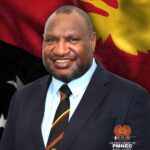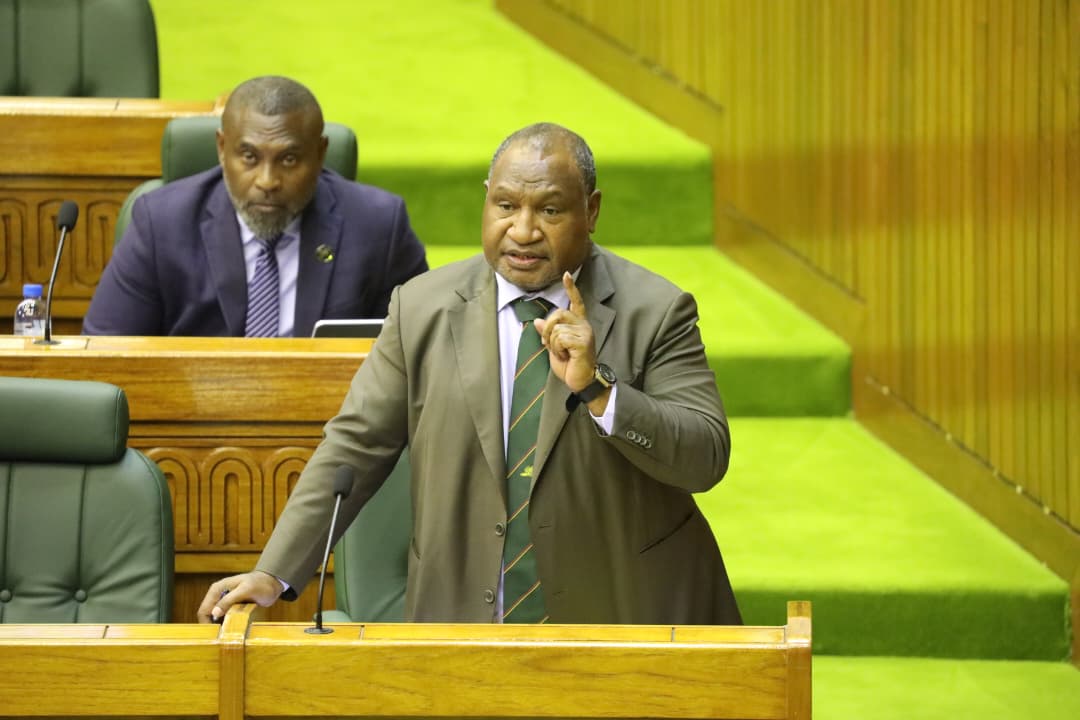Prime Minister Hon. James Marape today reaffirmed that the recently- signed Papua New Guinea–Australia Mutual Defence Treaty, known as the Pukpuk Treaty, is a forward- looking, sovereign decision by Papua New Guinea to strengthen its National Defence Capacity and Regional Security Posture while deepening the country’s historic relationship with Australia.
Responding to questions raised by Hiri-Koiari MP Hon. Keith Iduhu during Parliament’s Question Time, the Prime Minister clarified that the Treaty was initiated at PNG’s request, constructed within the bounds of the National Constitution, and does not compromise Papua New Guinea’s sovereignty in any way.
“As Prime Minister, I am the number-one security officer of this country,” PM Marape said.
“My foremost duty is to protect our people from external and internal threats. This Treaty was not imposed on us — we asked for it because it elevates the capacity of our Defence Force to stand alongside one of the Region’s most capable and trusted Defence partners.”
Legal and Constitutional Compliance
The Prime Minister assured the House that the Treaty fully complies with Section 206 of the PNG Constitution and the Visiting Forces Act of 1975, which provide the legal basis for Defence Cooperation with foreign forces.
“Our founding fathers created those provisions knowing that as a young nation we would need to cooperate with trusted partners,” PM Marape explained.
“This Treaty sits firmly within that Constitutional framework. Once all checks by the State Solicitor and relevant Agencies are complete, it will come before Parliament for debate and ratification under Section 117 — as required by law.”
Strengthening the PNG Defence Force
PM Marape said the Treaty represents the culmination of nearly five decades of Defence Cooperation between the two nations, beginning with the Status of Forces Agreement (1977) and later the Defence Cooperation Agreement (2013). The Pukpuk Treaty now lifts that relationship to the highest level — a Mutual Defence Treaty that ensures shared responsibility for Regional Peace and Security.
He emphasised that Papua New Guinea must build a modern, well-resourced Defence Force capable of safeguarding its 10 million people, 462,840 square kilometres of land, and over 3 million square kilometres of maritime and airspace.
“Our nation is not small,” the Prime Minister stated. “We have a vast ocean, a long border, and a growing population. Over the next 10 years, we will systematically grow our Defence Force to 7,000 men and women in uniform and 3,000 reservists. With the Treaty, we also create pathways for up to 10,000 Papua New Guineans to train and serve within the Australian Defence Force, building skills that will return home to strengthen our own capacity.”
The Treaty will enhance PNG’s Defence capability across land, air, and sea domains, including maritime surveillance, air mobility, technology transfer, and joint training.
Safeguarding Sovereignty and Regional Stability
PM Marape reiterated that the Pukpuk Treaty is founded on mutual respect, equality, and trust.
“This partnership does not erode our sovereignty — it strengthens it,” he said. “Our Defence Force will always report to the Commander of the PNG Defence Force. Australians, including Papua New Guineans serving under the Australian Defence Force, will report to their own commander. We train and operate side- by-side, but sovereignty is never compromised.”
He added that the Treaty acknowledges PNG’s right to maintain Defence relationships with other nations and is guided by the principles of non-alignment, transparency, and accountability.
“No bilateral partner has raised any objection,” PM Marape noted. “Every mature nation recognises the sovereign right of independent states to choose partners they trust. Geography and history bind us to Australia — we share a neighbourhood and a destiny.
A Strategic Investment in PNG’s Future
The Prime Minister described the Treaty as a strategic investment in National Security for future generations, enabling PNG to respond effectively to modern challenges including border incursions, transnational crime, illegal fishing, terrorism, and natural disasters.
“The Pukpuk Treaty is not about geopolitics — it’s about securing our home,” PM Marape said.
“Just as Israel’s long-term alliance with the United States has ensured its survival and strength, Papua New Guinea’s partnership with Australia will anchor our stability and growth for decades to come.” He also confirmed that the Government’s broader security agenda will include rebuilding the Police Force, Correctional Services, and national Law-and-Justice institutions so that “our entire Security Sector rises together.”
Shared History, Shared Destiny
PM Marape paid tribute to Australia as Papua New Guinea’s “foundational partner,” noting that the relationship is rooted in shared values of democracy, faith, and mutual respect.
“From the womb of Australia, we were birthed into our sovereign nationhood in 1975,” he reflected. “Fifty years on, Australia has never abandoned us. This Treaty reaffirms that enduring bond — not as subservient partners, but as equals standing side-by-side, protecting our common home.”
Conclusion
Prime Minister Marape concluded by reaffirming his commitment to National Unity, Constitutional Process, and the vision of a self-reliant Papua New Guinea.
“The Pukpuk Treaty is a tree we plant today whose shade future generations will enjoy,” he said.
“It ensures that our children and their children will inherit a safer, stronger, and more secure Papua New Guinea — confident in its sovereignty and proud of its partnerships.”






